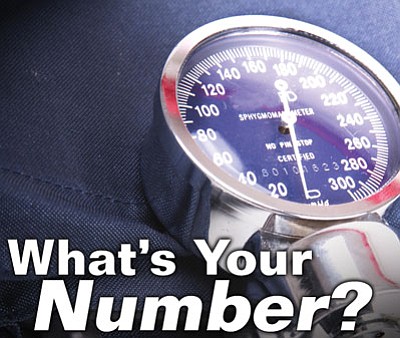BALTIMORE — May 17 is World Hypertension Day, an opportunity to promote public awareness of hypertension, or high blood pressure, and to encourage citizens to learn how to control this silent killer. As part of the CHECK IT, B’MORE initiative, there will be many opportunities for people to get their blood pressure checked and take the first step to improving their heart health, including:
•With the American Heart Association, the University of Maryland Medical Center will offer screening in a mobile van from 10 a.m. to 3 p.m. at City Hall, 100 N. Holliday Street in Baltimore.
•At the University of Maryland Medical Center Midtown Campus Community Health Education Center (CHEC), 821 N. Eutaw Street, Ste. 106, from 8 a.m. to 4 p.m.
•For more locations, see CHECK IT B-MORE, at http://umm.gd/2pie0a1
This is an issue of particular importance for the African-American community:
According to the Centers for Disease Control and Prevention (CDC), when compared with white individuals, African-Americans ages 18-49 are twice as likely to die from heart disease, and African-Americans ages 35-64 are 50 percent more likely to have high blood pressure.
Your heart pumps blood to provide energy and oxygen, and, with every beat, pushes against the sides of blood vessels. The strength of that pushing is called blood pressure. Blood pressure measurements help gauge the health of your heart and blood vessels. If your blood pressure is too high, you may be at risk for stroke, kidney disease, heart attack or other problems.
Individuals can make changes to lower their blood pressure by taking steps such as eating a well-balanced, low-salt diet; exercising regularly; maintaining a healthy weight; quitting smoking; limiting alcohol and taking medications properly.
See how you score on these facts and myths about high blood pressure— doctors call it hypertension.
Hypertension is common in the USA: Fact or Myth?
•Answer: Fact— About 75-80 million adults (1 in 3) in the US have high blood pressure, unfortunately, one out of every five Americans with hypertension is NOT aware they have it.
In some people, salt or sodium can increase blood pressure. You can keep your dietary sodium low by not using regular salt and simply substituting kosher or sea salt when cooking. Fact or Myth?
•Answer: Myth— About 75 percent of the dietary sodium we consume is hidden in processed foods like tomato sauce, soups, condiments and canned foods. It is important to read labels and watch for foods with large amounts of sodium. So-called salt alternatives like kosher or sea salt are the same as table salt— 40 percent sodium-and count the same as regular table salt toward your daily sodium or salt consumption.
Most people know when their blood pressure is high because they have headaches, sweating and feel “hyper.” Fact or Myth?
•Answer: Myth— Hypertension is called “the silent killer” because so many people who have high blood pressure have no symptoms when their pressure is high. You may not be aware that your high blood pressure could be damaging your heart, kidneys, brain or other organs. Know your numbers and let your doctor determine when you need to be treated.
Some people have high blood pressure readings at home but not in their doctor’s office. Fact or Myth?
•Answer: Fact— Many doctors recommend home monitoring since blood pressure can fluctuate. “Masked hyperten- hypertension” is a situation where the doctor repeatedly gets normal blood pressure readings but home monitoring reveals high readings. It was recently estimated that millions of Americans have masked hypertension, so ask your doctor about how to do home blood pressure monitoring.
Drinking four to five glasses of red wine a day is good for your heart and lowers your blood pressure. Fact or Myth?
•Answer: Myth— Heavy and regular use of alcohol can raise blood pressure dramatically. It can also lead to heart failure, stroke and irregular heartbeats.
If you drink, limit your consumption to no more than two drinks per day for men and one drink per day for women.
Remember, drink size matters. In general, one drink equals a 12-ounce beer, a four-ounce glass of wine, 1.5 ounces of 80-proof liquor or one ounce of hard liquor (100 proof).
If my blood pressure has been “normal” based on what I read on the Internet and I may be having medication side effects, I should stop taking my medication. Fact or Myth?
•Answer: Myth— Never make a medication decision solely based on information on the Internet without first talking to your doctor. Generally, most experts will state that a consistent blood pressure reading of 140/90 mmHg or more should be evaluated by a doctor. Stopping any medication without advice from your doctor is never a good idea.
Patients with little or no health insurance cannot control their high blood pressure because of the high price of medications. Fact or Myth?
•Answer: Myth— Nearly all patients will get some benefit from increasing their activity level and converting to a lower sodium diet. Reducing the average amount of salt or sodium that people eat from 3,400 milligrams (mg) to 2,300 milligrams (mg) per day-the level recommended in the Dietary Guidelines for Americans, 2010-may reduce cases of high blood pressure by 11 million. Many drugs are now available in a less costly generic (non-brand name) form especially if you ask your pharmacist or doctor.
References: CDC: High Blood Pressure facts and the American Heart Association: Common High Blood Pressure Myths
